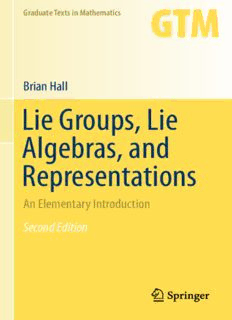Table Of ContentGraduate Texts in Mathematics
Brian Hall
Lie Groups, Lie
Algebras, and
Representations
An Elementary Introduction
Second Edition
Graduate Texts in Mathematics 222
Graduate Texts in Mathematics
SeriesEditors:
SheldonAxler
SanFranciscoStateUniversity,SanFrancisco,CA,USA
KennethRibet
UniversityofCalifornia,Berkeley,CA,USA
AdvisoryBoard:
AlejandroAdem,UniversityofBritishColumbia
DavidJerison,UniversityofCaliforniaBerkeley&MSRI
IreneM.Gamba,TheUniversityofTexasatAustin
JeffreyC.Lagarias,UniversityofMichigan
KenOno,EmoryUniversity
JeremyQuastel,UniversityofToronto
FadilSantosa,UniversityofMinnesota
BarrySimon,CaliforniaInstituteofTechnology
Graduate Texts in Mathematics bridge the gap between passive study and
creative understanding, offering graduate-level introductions to advanced topics
in mathematics. The volumes are carefully written as teaching aids and highlight
characteristic features of the theory. Although these books are frequently used as
textbooksingraduatecourses,theyarealsosuitableforindividualstudy.
Moreinformationaboutthisseriesathttp://www.springer.com/series/136
Brian Hall
Lie Groups, Lie Algebras,
and Representations
An Elementary Introduction
Second Edition
123
BrianHall
DepartmentofMathematics
UniversityofNotreDame
NotreDame,IN,USA
ISSN0072-5285 ISSN2197-5612 (electronic)
GraduateTextsinMathematics
ISBN978-3-319-13466-6 ISBN978-3-319-13467-3 (eBook)
DOI10.1007/978-3-319-13467-3
LibraryofCongressControlNumber:2015935277
SpringerChamHeidelbergNewYorkDordrechtLondon
©SpringerInternationalPublishingSwitzerland2003,2015
Thisworkissubjecttocopyright.AllrightsarereservedbythePublisher,whetherthewholeorpartof
thematerialisconcerned,specificallytherightsoftranslation,reprinting,reuseofillustrations,recitation,
broadcasting,reproductiononmicrofilmsorinanyotherphysicalway,andtransmissionorinformation
storageandretrieval,electronicadaptation,computersoftware,orbysimilarordissimilarmethodology
nowknownorhereafterdeveloped.
Theuseofgeneraldescriptivenames,registerednames,trademarks,servicemarks,etc.inthispublication
doesnotimply,evenintheabsenceofaspecificstatement,thatsuchnamesareexemptfromtherelevant
protectivelawsandregulationsandthereforefreeforgeneraluse.
Thepublisher,theauthorsandtheeditorsaresafetoassumethattheadviceandinformationinthisbook
arebelievedtobetrueandaccurateatthedateofpublication.Neitherthepublishernortheauthorsor
theeditorsgiveawarranty,expressorimplied,withrespecttothematerialcontainedhereinorforany
errorsoromissionsthatmayhavebeenmade.
Printedonacid-freepaper
SpringerInternational PublishingAGSwitzerlandispartofSpringerScience+Business Media(www.
springer.com)
ForCarla
Contents
PartI GeneralTheory
1 MatrixLieGroups.......................................................... 3
1.1 Definitions............................................................ 3
1.2 Examples ............................................................. 5
1.3 TopologicalProperties ............................................... 16
1.4 Homomorphisms..................................................... 21
1.5 LieGroups............................................................ 25
1.6 Exercises.............................................................. 26
2 TheMatrixExponential ................................................... 31
2.1 TheExponentialofaMatrix......................................... 31
2.2 ComputingtheExponential.......................................... 34
2.3 TheMatrixLogarithm ............................................... 36
2.4 FurtherPropertiesoftheExponential............................... 40
2.5 ThePolarDecomposition............................................ 42
2.6 Exercises.............................................................. 46
3 LieAlgebras................................................................. 49
3.1 DefinitionsandFirstExamples...................................... 49
3.2 Simple,Solvable,andNilpotentLieAlgebras...................... 53
3.3 TheLieAlgebraofaMatrixLieGroup............................. 55
3.4 Examples ............................................................. 57
3.5 LieGroupandLieAlgebraHomomorphisms...................... 60
3.6 TheComplexificationofaRealLieAlgebra ....................... 65
3.7 TheExponentialMap ................................................ 67
3.8 ConsequencesofTheorem3.42 ..................................... 70
3.9 Exercises.............................................................. 73
4 BasicRepresentationTheory.............................................. 77
4.1 Representations....................................................... 77
4.2 ExamplesofRepresentations........................................ 81
4.3 NewRepresentationsfromOld...................................... 84
vii
viii Contents
4.4 CompleteReducibility............................................... 90
4.5 Schur’sLemma....................................................... 94
4.6 Representationsofsl.2IC/ .......................................... 96
4.7 GroupVersusLieAlgebraRepresentations......................... 101
4.8 ANonmatrixLieGroup.............................................. 103
4.9 Exercises.............................................................. 105
5 TheBaker–Campbell–HausdorffFormulaandItsConsequences.... 109
5.1 The“Hard”Questions................................................ 109
5.2 AnIllustrativeExample.............................................. 110
5.3 TheBaker–Campbell–HausdorffFormula.......................... 113
5.4 TheDerivativeoftheExponentialMap............................. 114
5.5 ProofoftheBCHFormula........................................... 117
5.6 TheSeriesFormoftheBCHFormula .............................. 118
5.7 GroupVersusLieAlgebraHomomorphisms....................... 119
5.8 UniversalCovers ..................................................... 126
5.9 SubgroupsandSubalgebras.......................................... 128
5.10 Lie’sThirdTheorem ................................................. 135
5.11 Exercises.............................................................. 135
PartII SemisimpleLieAlgebras
6 TheRepresentationsofsl.3IC/........................................... 141
6.1 Preliminaries.......................................................... 141
6.2 WeightsandRoots ................................................... 142
6.3 TheTheoremoftheHighestWeight ................................ 146
6.4 ProofoftheTheorem ................................................ 148
6.5 AnExample:HighestWeight.1;1/................................. 153
6.6 TheWeylGroup...................................................... 154
6.7 WeightDiagrams..................................................... 158
6.8 FurtherPropertiesoftheRepresentations........................... 159
6.9 Exercises.............................................................. 165
7 SemisimpleLieAlgebras................................................... 169
7.1 SemisimpleandReductiveLieAlgebras............................ 169
7.2 CartanSubalgebras................................................... 174
7.3 RootsandRootSpaces............................................... 176
7.4 TheWeylGroup...................................................... 182
7.5 RootSystems......................................................... 183
7.6 SimpleLieAlgebras ................................................. 185
7.7 TheRootSystemsoftheClassicalLieAlgebras................... 188
7.8 Exercises.............................................................. 193
8 RootSystems................................................................ 197
8.1 AbstractRootSystems............................................... 197
8.2 ExamplesinRankTwo............................................... 201
8.3 Duality................................................................ 204
Contents ix
8.4 BasesandWeylChambers........................................... 206
8.5 WeylChambersandtheWeylGroup................................ 212
8.6 DynkinDiagrams..................................................... 216
8.7 IntegralandDominantIntegralElements........................... 218
8.8 ThePartialOrdering ................................................. 221
8.9 ExamplesinRankThree............................................. 228
8.10 TheClassicalRootSystems ......................................... 232
8.11 TheClassification .................................................... 236
8.12 Exercises.............................................................. 238
9 RepresentationsofSemisimpleLieAlgebras............................ 241
9.1 WeightsofRepresentations.......................................... 241
9.2 IntroductiontoVermaModules...................................... 244
9.3 UniversalEnvelopingAlgebras...................................... 246
9.4 ProofofthePBWTheorem.......................................... 250
9.5 ConstructionofVermaModules..................................... 254
9.6 IrreducibleQuotientModules ....................................... 257
9.7 Finite-DimensionalQuotientModules.............................. 260
9.8 Exercises.............................................................. 263
10 FurtherPropertiesoftheRepresentations............................... 265
10.1 TheStructureoftheWeights ........................................ 265
10.2 TheCasimirElement................................................. 269
10.3 CompleteReducibility............................................... 273
10.4 TheWeylCharacterFormula........................................ 275
10.5 TheWeylDimensionFormula....................................... 281
10.6 TheKostantMultiplicityFormula................................... 287
10.7 TheCharacterFormulaforVermaModules ........................ 294
10.8 ProofoftheCharacterFormula...................................... 295
10.9 Exercises.............................................................. 303
PartIII CompactLieGroups
11 CompactLieGroupsandMaximalTori................................. 307
11.1 Tori.................................................................... 308
11.2 MaximalToriandtheWeylGroup.................................. 312
11.3 MappingDegrees..................................................... 315
11.4 QuotientManifolds................................................... 321
11.5 ProofoftheTorusTheorem ......................................... 326
11.6 TheWeylIntegralFormula .......................................... 330
11.7 RootsandtheStructureoftheWeylGroup......................... 333
11.8 Exercises.............................................................. 339
12 TheCompactGroupApproachtoRepresentationTheory............ 343
12.1 Representations....................................................... 343
12.2 AnalyticallyIntegralElements ...................................... 346
12.3 OrthonormalityandCompletenessforCharacters.................. 351
Description:This textbook treats Lie groups, Lie algebras and their representations in an elementary but fully rigorous fashion requiring minimal prerequisites. In particular, the theory of matrix Lie groups and their Lie algebras is developed using only linear algebra, and more motivation and intuition for pro

